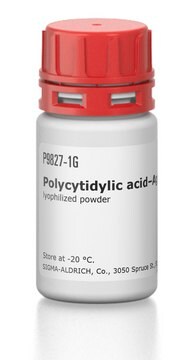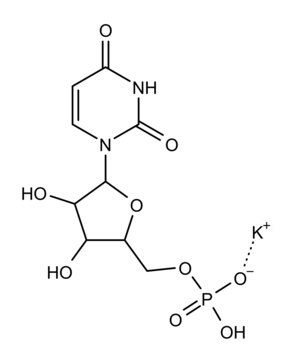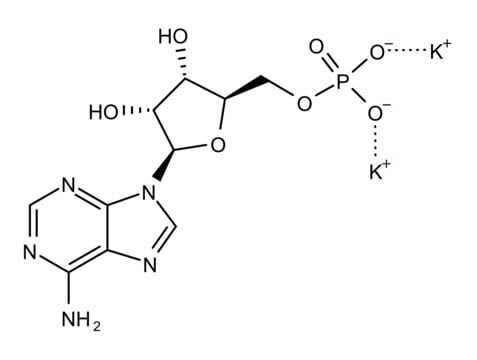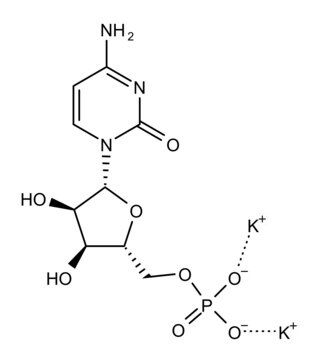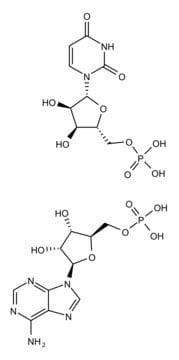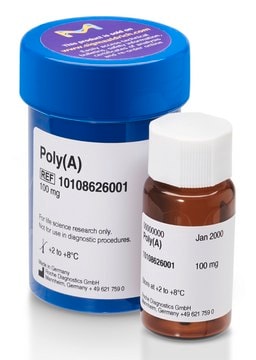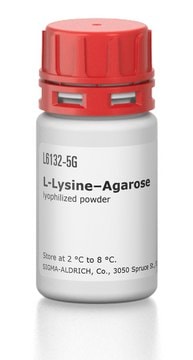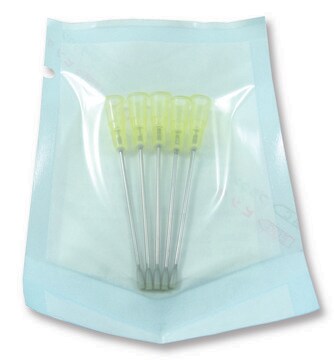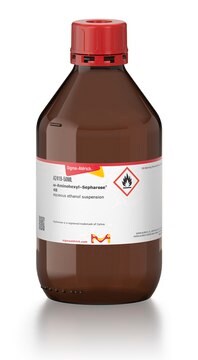P8563
Polyuridylic acid–Agarose
lyophilized powder, matrix polyacrylhydrazido-agarose
Synonym(s):
Poly(U)–Agarose potassium salt
Sign Into View Organizational & Contract Pricing
All Photos(3)
About This Item
Recommended Products
form
lyophilized powder
Quality Level
extent of labeling
0.1-1.0 mg per mL
matrix
polyacrylhydrazido-agarose
matrix attachment
ribose moiety after periodate oxidation
swelling
1 g swells to ~4 mL
capacity
≥0.2 mg/mL binding capacity (poly(A) (P 9403))
storage temp.
−20°C
Application
Polyuridylic acid-agarose is used in protein chromatography, affinity chromatography and specialty resins. Polyuridylic acid has been used to study insulin receptors and to develop polyclonal antibodies against RNase L.
Physical form
Lyophilized powder stabilized with lactose
Storage Class
11 - Combustible Solids
wgk_germany
WGK 3
flash_point_f
Not applicable
flash_point_c
Not applicable
ppe
Eyeshields, Gloves, type N95 (US)
Certificates of Analysis (COA)
Search for Certificates of Analysis (COA) by entering the products Lot/Batch Number. Lot and Batch Numbers can be found on a product’s label following the words ‘Lot’ or ‘Batch’.
Already Own This Product?
Find documentation for the products that you have recently purchased in the Document Library.
T Salehzada et al.
The Journal of biological chemistry, 266(9), 5808-5813 (1991-03-25)
RNase L activated by 2-5A (a series of 2'-5'-linked adenylic oligoribonucleotides) is a key enzyme of the interferon system. To study RNase L (endonuclease L) in intact cells independently of intracellular 2-5A and of its activity, we have developed polyclonal
J P Medema et al.
Cell growth & differentiation : the molecular biology journal of the American Association for Cancer Research, 7(4), 543-550 (1996-04-01)
We have used two approaches to identify possible substrates of the insulin receptor (IR) tyrosine kinase. First, we used a potent tyrosine phosphatase inhibitor, phenylarsine oxide (PAO), which is reported to be specific for the insulin-induced signal transduction route, to
Eulàlia Belloc et al.
Nature, 452(7190), 1017-1021 (2008-04-04)
In vertebrate oocytes, meiotic progression is driven by the sequential translational activation of maternal messenger RNAs stored in the cytoplasm. This activation is mainly induced by the cytoplasmic elongation of their poly(A) tails, which is mediated by the cytoplasmic polyadenylation
N J Horscroft et al.
The Journal of general virology, 81(Pt 8), 1961-1965 (2000-07-19)
The bluetongue virus ssRNA-binding protein, NS2, is a phosphoprotein that forms viral inclusion bodies in infected cells. Recombinant NS2 was expressed in the baculovirus expression system and purified to homogeneity from insect cells. Purified NS2 bound nucleosides. Further investigation revealed
L P Gavrilova et al.
FEBS letters, 178(2), 283-287 (1984-12-10)
The stoichiometry of GTP hydrolysis during peptide elongation in the processes of codon-specific translation and misreading of polyuridylic acid was determined in a cell-free system in which all ribosomes were active in peptide synthesis. Ribosomes carrying oligophenylalanine presynthesized on poly(U)
Our team of scientists has experience in all areas of research including Life Science, Material Science, Chemical Synthesis, Chromatography, Analytical and many others.
Contact Technical Service